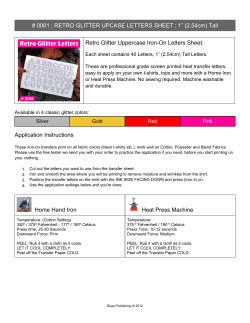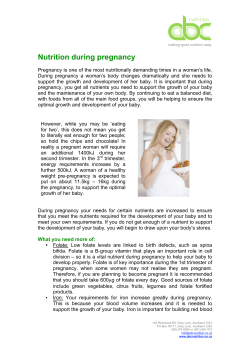
Highlights: Current Corporate Structure
30 April 2014 MEMORANDUM OF UNDERSTANDING FOR OFFTAKE AGREEMENT SIGNED WITH ASMET (UK) LIMITED Highlights: MOU for offtake for 100,000 – 150,000 tonnes of graphite per annum at a price of approximately US$1,000 per tonne signed with Asmet (UK) Limited, a European trader of metallurgical consumables (including carbon) to the iron, steel and aluminium industries. Graphite intended to be used by Asmet as a recarburiser in mainly foundry applications and high quality steel production. The MOU for 80,000 – 100,000 tonnes of graphite per annum and an unspecified amount of vanadium signed with Chalieco is progressing well with Chalieco representatives having completed extensive field visit. ASX Code Current Corporate Structure Ordinary Shares Issued Shares: Exercisable at $0.26: Exercisable at $2.21: Exercisable at $2.90: Exercisable at $3.87: Directors Citicorp Nom PL Copper Strike Ltd HSBC Custody Nom Aus Ltd Gasmere PL Samples of Balama graphite over all size fractions have been tested for traditional and high technology applications and found to be superior to Chinese produced graphite Board of Directors MEMORANDUM OF UNDERSTANDING FOR OFFTAKE WITH ASMET Syrah Resources (ASX:SYR) is very pleased to announce that it has signed a Memorandum of Understanding (MOU) for an offtake agreement with Asmet (UK) Limited (Asmet). Asmet is a global supplier of metallurgical consumables and specialist products to the iron, steel and aluminium industries. Asmet was established over 25 years ago and has more than 500 customers in over 30 countries. Asmet sells a range of carbon products, including foundry coke, petroleum coke and graphite. 2,489,467 130,000 250,000 1,000,000 Major Shareholders Helionjiang Province (like Shandong Province) has announced plans to shut down polluting graphite mines. Syrah has been approached by several Chinese graphite buyers looking for product. Syrah is in advanced discussions with a large European graphite trader for graphite offtake in to Europe. Syrah expects to be able to announce progress on this offtake next month. 162,475,614 Options SYR 22.28% 12.04% 6.77% 6.52% 4.00% Mr Tom Eadie Non-Executive Chairman Mr Paul Kehoe Managing Director Mr Tolga Kumova Executive Director Mr Rhett Brans Non-Executive Director Ms Melanie Leydin Company Secretary Key Project Balama Graphite Project (Mozambique) Balama is the largest and one of the highest grade flake graphite and vanadium projects globally. www.syrahresources.com.au Under the MOU, Asmet will buy 100,000 to 150,000 tonnes of graphite per annum at a price of approximately US$1,000 per tonne over an initial period of 5 years. Under the MOU, Syrah will provide to Asmet with 2 to 3 tonnes of samples of graphite products to enable Asmet to undertake testing of the products. Subject to successful completion of this testwork, Syrah and Asmet will be required to negotiate in good faith a formal offtake agreement for the sale of graphite. Asmet intends to use Balama graphite as a recarburiser in mainly foundry applications and high quality steel production. Recarburiser is a term which is also referred to in the steel industry as carbon additive or carbon riser. All steel is an alloy with the two major components being iron and carbon. Carbon is added as a hardening agent. Other elements typically added to steel include manganese (to improve the workability of the steel), nickel (resistance to corrosion), vanadium (extra strengthening) etc. For most steel applications such as construction steel, the carbon used is anthracite coal, metallurgical coal, calcined petroleum coke or amorphous graphite. These applications require low amounts of carbon (<1%) and the carbon sells for low values (<US$500 per tonne). Syrah will not be seeking to substitute graphite in to these markets. However, cast iron is a steel alloy which requires a high amount of carbon (up to 4%) along with manganese, silicon and other minor elements. One of the major categories of cast iron is gray iron which can use graphite as a carbon alloy. Gray iron is used to make engine blocks (Figure 1), pump housings, valve bodies, electrical boxes, decorative castings, cast iron cookware and disc brake rotors. Figure 1 – Engine block made from gray iron (Source: Shelmet castings – www.shelmetcastings.com) Worldwide gray iron production is about 46 million tonnes per annum (47 th Census of World Casting Production). Assuming a 3-4% carbon content, this results in a carbon market of 1.38 to 1.84 million tonnes. Ductile iron is another important category of cast iron which likewise can use graphite as its carbon alloy. The major use for ductile iron is the ductile iron pipe which is used for water and sewer lines. Worldwide ductile iron production is about 25 million tonnes per annum (47 th Census of World Casting Production). Assuming a 3-4% carbon content, this results in a carbon market of 750,000 tonnes to 1 million tonnes. Although low quality recarburiser such as anthracite coal, metallurgical coal, calcined petroleum coke and amorphous graphite can be used to make cast iron, it produces a poor quality product. This is due to the high degree of impurities in these carbons such as sulphur, nitrogen, hydrogen, ash, moisture and volatiles. These impurities are particularly harmful to ductile iron. Although flake graphite can also be used as a recarburiser it is not common to do so because most flake graphite produced from China has high impurities (particularly sulphur content). Also, as most quality flake graphite can be sold in refractory applications at a higher price than recarburiser, few graphite miners are prepared to take a price sacrifice to sell in to the recarburiser market. Figure 2 – Ductile iron pipe (Source: Steellot – www.steellot.com) Balama Graphite is considered ideal for use as a recarburiser as it contains low harmful impurities. Balama Graphite can be readily upgraded to 96%+ concentrate through simple flotation. The majority of the gangue in the concentrate is quartz (silica) which is not an impurity in cast iron processing. Also, Balama Graphite has a very low sulphur content (<.01% sulphur). Figure 3 shows a recarburiser pellet made from Balama graphite. High quality recarburiser sells for US$1,200 to US1,500 a tonne. By setting an initial price of US$1,000 a tonne, Syrah believes it can rapidly capture market share in this industry . Figure 3 – Recarburiser pellet made from Balama graphite PROGRESS OF MOU FOR OFFTAKE SIGNED WITH CHALIECO On 7 March 2014, Syrah announced MOU for offtake for 80,000-100,000 tonnes of graphite per annum and a quantity of vanadium to be determined with Chalieco. The MOU requires the parties to negotiate a legally binding offtake agreement within three months of signing the MOU. Chalieco has completed field due diligence. This entailed a visit to Maputo, the capital of Mozambique to meet with various Mozambique Government officials and to better understand the Mozambique regulatory framework. The trip also involved a trip to Pemba Port to determine port access. Finally, Chalieco visited the Balama Graphite and Vanadium deposit itself and also viewed its nearby infrastructure (roads, dam and grid power). Syrah has been informed by Chalieco that it was very satisfied with all aspects of the visit and is very excited to be working with Syrah on the project. Figure 4 – Photographs from Chalieco visit to Mozambique and Balama Syrah has also provided Chalieco with Balama graphite samples for their testwork. Upon completion of this testwork, Syrah expects that Chalieco will be in a position to negotiate final offtake agreement, including pricing of both graphite and vanadium. SUPPLY OF GRAPHITE IN TO CHINA Approximately one week ago, Heliongjiang province in China officially announced plans to shut down polluting flake graphite operations and to start consolidating graphite mines over the next 18 months. Heliongjiang accounts for about 45% of Chinese production and 29% of global output in 2013 (Source: Industrial Minerals). In December 2013, Shandong Province was ordered to halt production of graphite for environmental reasons. Shandong Province represents about 20% of Chinese production (Source: Industrial Minerals). The cumulative effect of these two decisions is that a substantial amount of worldwide graphite production is now in doubt. In recent months, Syrah has had direct approaches by several China based downstream “value add” graphite companies seeking to purchase graphite. These companies make graphite products such as spherical graphite, graphite foil, expandable graphite. Most of these buyers own graphite deposits in China which supply the raw material. However, as their mines have been closed down they face a critical shortage of graphite which places in jeopardy their value add processing businesses. Samples of Balama graphite over all size fractions have been tested for traditional and high technology applications and found to be superior to Chinese produced graphite. Syrah’s preferred course is to distribute graphite in China via its proposed offtake relationship with Chalieco. FURTHER OFFTAKE AGREEMENT Syrah is in advanced discussions with a large European graphite trader for graphite offtake in to Europe. This agreement is for traditional graphite uses, such as refractory bricks. Syrah expects to be able to announce progress on this offtake next month. OTHER OPPORTUNITIES Over the past six months Syrah’s marketing team has been very busy introducing Balama graphite to new markets Syrah is targeting. Syrah has exhibited at several exhibition and conferences around the world. As a result of these exhibitions, Balama graphite is widely known in these markets and has started to get significant interest from the major global players all around the world. Additional interest other than mentioned in this release has come from very significant carbon buyers from the United States, India and Japan. Syrah’s marketing team is responding to this interest and is preparing samples for their tests in order to progress negotiations to the next phase. Paul Kehoe Managing Director Syrah Resources Ltd Mobile contact - +61 3 414156288 Email – p.kehoe@syrahresources.com.au About Syrah Resources Syrah Resources (ASX code: SYR) is an Australian resource company with a diversified exploration portfolio located in southeast Africa. The Company is rapidly progressing its core Balama Graphite and Vanadium Project in Mozambique to production. Balama is a 106 km 2 granted prospecting licence located within the Cabo Delgado province in the district of Namuno in northern Mozambique. The project is approximately 265 km by road west of the port town of Pemba. Pemba Port is a deep-water container port, and the third largest in Mozambique. The Balama Project site is accessible by a sealed, main road, running directly from the airport and Pemba Port. The main road is located 1 km from the airport. Syrah’s exploration portfolio also includes a strategic mineral sands portfolio in Tanzania, comprising eight tenement areas, some with high grade heavy mineral intersections, and the Nachingwea graphite project in Tanzania.
© Copyright 2025





















